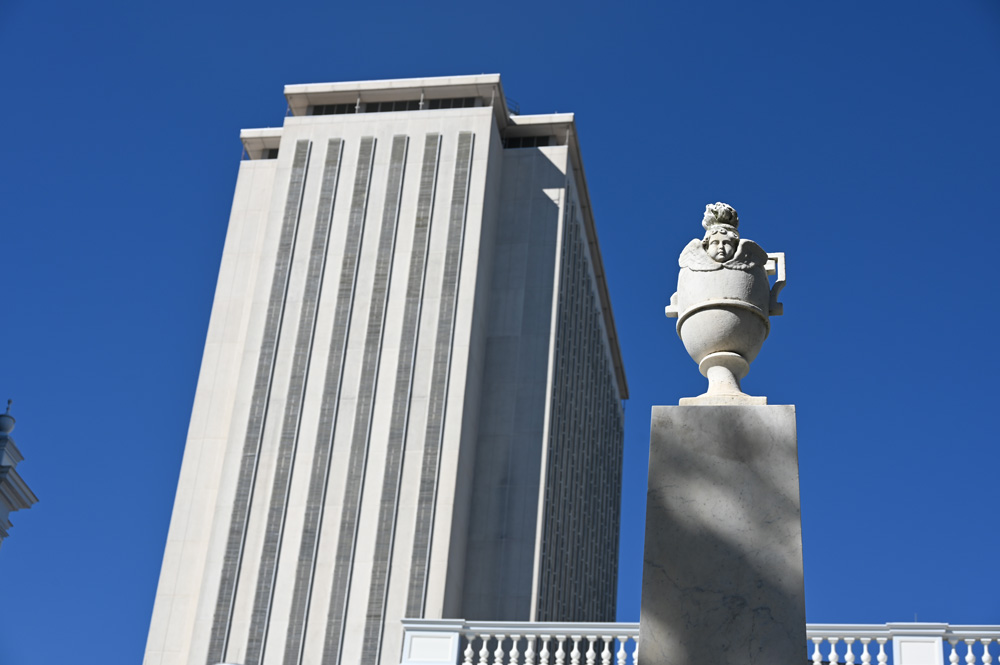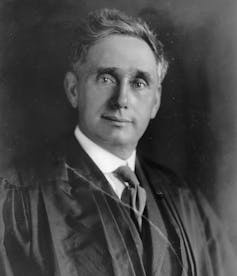
By David Cuillier
Florida, the “Sunshine State,” once known as a beacon of government transparency, is growing ever darker, and the clouds are spreading throughout the United States. (See: Florida’s Sunshine Law Is Dying.”)
From March 16-22, 2025, the nation celebrates the 20th anniversary of national Sunshine Week, which originated in Florida, historically home to the most transparent and accountable governments in the country.
Times have changed.
At the University of Florida Joseph L. Brechner Freedom of Information Project, my colleagues and I have researched and taught about the freedom of information since 1977. We monitor the state of open, accountable government, and our research findings do not bode well for democracy – in Florida and throughout the U.S.
But first, let’s look back to sunnier days.
Sun rises
Florida enacted its first version of a public records law in 1909, the sixth state to do so. The movement was led by Nebraska in 1866 and Montana in 1895. Florida’s law was repealed in the 1950s and then returned in 1967 as the Sunshine Law.
“Sunshine” was equated with the state’s nickname but also the concept of government transparency – lighting the dark recesses of secrecy. The Sunshine Law also played on a famous quote by former Supreme Court Justice Louis Brandeis that “Sunlight is said to be the best of disinfectants; electric light the most efficient policeman.”

HUM Images/Universal Images Group via Getty Images
Something unique happened in Florida then. Transparency took hold.
Journalists such as Pete Weitzel at the Miami Herald pushed hard for governments to operate more transparently, building momentum through the Florida Society of Newspaper Editors. They and other media groups helped launch, with US$11,000, the Florida Freedom of Information Clearinghouse in 1977 at the University of Florida. The journalism college assigned a professor and grad student to monitor public record denials, open meeting closures and court cases, and to alert newspaper editors to secrecy legislation. This effort created a culture of transparency, including among elected leaders.
Journalists successfully pushed for a constitutional amendment in the early 1990s, which required transparency across the state and required a two-thirds vote from the state Legislature to adopt exemptions to the law.
Several provisions of Florida public records law stood out:
• Attorney fee-shifting is mandatory. If a citizen is denied government information, sues and prevails, the agency is required to pay the person’s attorney fees. Our research indicates that this is one of the most important elements in public record laws to encourage compliance.
• The definition of a public record is broad, even applying to documents created by a private person or contractor acting on behalf of the government. Applying the law to private actors is unique in the U.S., and even in the world.
• Governing bodies face strict requirements to deliberate in public. Just two officials communicating with each other constitutes an official meeting and must be announced ahead of time, allowing for public attendance. Most states require a quorum, or majority, of the governing body to be considered an official meeting.
The nonprofit Florida First Amendment Foundation was launched in 1985 to promote government transparency and hired its first paid employee, Barbara Petersen, in 1995, to monitor secrecy legislation, train public employees and aid people trying to get information. The organization banded with the Florida Society of Newspaper Editors to create Sunshine Sunday each March to promote the right to know. This event went national in 2005 as Sunshine Week.
All these factors led Florida to become known as the most transparent state in the nation.
Increasing clouds
Fast forward to 2025, and we see an entirely different climate in Florida.
The decline of newspapers has meant fewer reporters pushing for records, fewer editors advocating for transparency, and fewer owners suing government agencies.
Copy charges related to getting public records create barriers for average citizens. Research shows that providing fee waivers would increase accessibility without significant costs.
Through the years, legislators became emboldened to pass more exemptions to the Florida Sunshine Law – more than 1,100 and growing. Some of those exemptions were focused on protecting personal privacy – for example, in reaction to journalists requesting the autopsy file of NASCAR driver Dale Earnhardt after his 2001 death.
Fear of terrorists following 9/11 led to a flurry of exemptions, such as hiding records about crop dusters to prevent al-Qaida from hijacking planes to spread anthrax.
Companies profiting from public records sparked another backlash. For example, some companies acquired public mugshots, posted them online and allowed people to have them removed for a price. Some attorneys gamed the fee-shifting provision, submitting public record requests that would be difficult to fulfill, sued immediately and then settled with agencies for thousands of dollars.
Elected leaders turned against transparency, Petersen, who now directs the Florida Center for Government Accountability, told me recently. One of the prominent examples she points to is Gov. Ron DeSantis’ refusal to disclose his travel expense records.
I hear it every week – calls from journalists and others stymied by state and local government agencies. They often cite high copy fees for public records, claims of exemptions and outright ghosting by agencies. One reporter encountered Miami city commissioners sworn in at a private ceremony. Another challenged Tallahassee police refusing to provide information about an officer-involved shooting. A college journalism student was told she had to pay $1,665 for records about Florida dams that could fail and ended up pleading with the government to “free the dam records.”
One of my studies from 2019 indicated that, on average, if you requested a public record in Florida, you would receive it about 39% of the time. That placed the state 31st in the nation, the bottom half.
More recent data from the nonprofit MuckRock reports Florida’s percentage declining – as of February 2025, to 35%.
Bobby Block, current director of the Florida First Amendment Foundation, wrote in February that “There was a time when Florida set the gold standard for open government. … Those days are over.”
Not just Florida
Florida is reflective of a national trend – a secrecy creep spreading throughout the country, culminating in transparency deserts in cities big and small.
The United States is losing its reputation as a leader in open, accountable government. Its federal Freedom of Information Act, often known as FOIA, ranks 78th in strength out of 140 nations, and continuously drops as new countries adopt better laws. An information commissioner from Africa told me a few months ago that he and his colleagues laugh at the United States’ weak FOIA law, referring to it as a “toothless poodle.”
On average, according to our research, if you asked for a public record in America 10 years ago, you would get it about half the time. Now, it’s down to about a third of the time, and just 12% at the federal level.
Even the U.S. Department of Justice’s own statistics show a similar decline in full release of records, and the average response time has nearly doubled over the same period, from 21 to 40 days.
What happens when compliance reaches 0%?
Aside from the ramifications on democracy itself, every American will feel the pain in their pocketbooks and everyday lives.
Studies show that public record laws lead to cleaner drinking water, safer restaurants, better-informed school choice, less corruption, saved tax dollars and a lower chance of sex offenders reoffending.
According to Stanford economist James Hamilton, for every dollar spent on public-records journalism, society benefits $287 in saved lives and more efficient government.
Some transparency advocates have raised the alarm on actions taken by the new Trump administration, such as the removal of agency websites, the firing of FOIA staff and the dismantling of the Open Government Federal Advisory Committee.
It is likely these efforts will escalate the secrecy creep and allow it to trickle down to the state and local levels. It is important to note, though, that declining transparency is a long-term trend that transcends any one president or political party. The federal government reached its absolute low in full compliance with FOIA last year, under the Biden administration.
It’s easy to point fingers at one politician, but perhaps wiser to look at the entire system, which many scholars say is broken and should be reimagined.
German sociologist Max Weber posited that secrecy is the natural tendency for bureaucracy if left unchecked. For decades, news companies, particularly in Florida, pushed back against that secrecy through public pressure and litigation.
With that opposing force weakened, if not disappearing, what or who will replace it?
Nonprofit groups have filled some of the gap, and independent online news sites are growing and enforcing public record laws.
But will it be enough? Ultimately, it is up to the citizenry. If the people don’t cherish and demand transparent government, then the politicians certainly won’t, whether in Florida or the rest of the country.
![]()
David Cuillier is Director of the Brechner Freedom of Information Project at the College of Journalism and Communications at the University of Florida.





























Gene Perez says
Our Sunshine Law in Florida is a mixed blessing. Requiring that all negotiations by public officials be conducted in public sounds wonderful. And it may be, but should all negotiations be public? In other arenas, such as business, deals are made over golf, meals or adult beverages. The results are then announced publicly. Is this so bad? Public officials need some ability to discuss in private what will be negotiated in public. I think that understanding other points of view beforehand would likely improve the quality of decisions made by public officials.
Pogo says
@”… All these factors led Florida to become known as the most transparent state in the nation…”
And then came jeb!, and charlie, and tricky rick, and meatball ron…
To become truly great, one has to stand with people, not above them.
— Baron de Montesquieu
https://www.google.com/search?q=Montesquieu+quotes
More
https://www.google.com/search?q=Montesquieu
Deborah Coffey says
The Washington Post has it right: “Democracy Dies in Darkness.”
Pierre Tristam says
With its publisher’s complicity.
Sherry says
AGAIN. . . Private businesses and governments do NOT serve the same purpose. The elected government officials are in their respective positions to “serve the will of the people”.
In the employer/employee scenario the politician is the “employee” and their constituents are the “employer”. It makes to sense that the “employee” political leader should have discussions and make decisions without the “employer” constituents being a primary part of that process.
Deborah Coffey says
@ Pierre
Agreed and unsubscribed, but the statement is true.
Sherry says
OOPS! So sorry! I meant to say it makes “NO” sense that the “employee” political leader has meetings and makes decisions without the “employer” constituents being a primary part of that process.
Been There says
They haven’t been operating in the sunshine for years. The O’Brien, Mullins, Sullivan, Cameron reign all used burner phones. Cameron would have Al Hadeed print memos and place them on his desk so that Cameron to shred them instead of using email so there was no record.